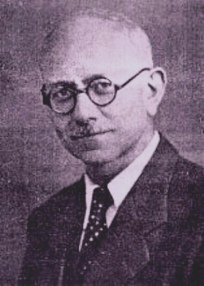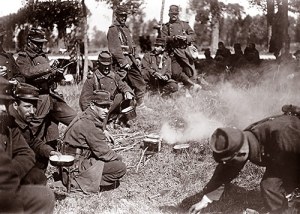Marc Bloch: The Historian’s Craft (Part 4)
This is the fourth part of a seven part series on March Bloch’s classic “The Historian’s Craft.” Access Part 1 and Part 2 and Part 3.
![]()

“Coincidence is one of those freaks that cannot be eliminated from history.”
-Marc Bloch
The third chapter of Bloch’s famous The Historian’s Craft, concerns historical criticism. Unlike the theoretical concepts of historiography presented earlier, this chapter dabbles in what is now considered blasphemy to disregard – the examination, refutation, and elaboration of evidence. It also makes a case for historical criticism – criticism of any kind, really – which is today taken for granted. The gulf between the 1940s historiographical climate and today is more striking than before.
As mentioned in Part 3, witnesses (and evidence) should not be taken at their words – “with ink,” Bloch writes, “anyone can write anything.”
This sentiment can be carried into the twenty-first century as well – anyone with a computer can become an expert on anything. Readers have lamented on my site about such a thing in my review of the history of Haiti. The same is being leveled, rightfully, on the “first draft of history” being written in Iran. Speaking to this point, Max Ajl on his blog, Jewbonics:
“Reading liberal and left-wing commentary on what’s going on in Iran, I’ve been rather shocked. Everyone–including this writer–transforms into a savagely incisive Iran scholar equipped to pontificate on Iranian society, its domestic political institutions, the Waliyat-al-Faqih, the social composition of Ahmadinejad supporters and Mousavi supporters, etc. etc., enlightened by studious Twitter research, perusal of YouTube videos, a glance at Juan Cole’s blog, and for the extremely careful, a quick read through the last 50 pages of A People Interrupted [a recent book by Hamid Dabashi].”
Anyone can write – about history or whatever – but it is the job of the historian to relate information with evaluation. In short, it is the job of the historian to at once weed through the bullshit to find the truth and then offer an alternative – to, in essence, dispel the misinformation. As Ellies du Pin, an eighteenth-century historian, states, criticism is the “species of torch which lights our way down the darkened corridors of antiquity, enabling us to distinguish the true from the false.” In Bloch’s words:
“Like Cartesian ‘science,’ the criticism of historical evidence makes a tabula rasa of its beliefs. Like Cartesian science, too, it proceeds inexorably to knock out the props of antiquity only in order thereby to arrive at new certainties (or very strong probabilities), which are thenceforth duly proved. In other words, the idea supposes an almost total overturn of older conceptions of doubt…
“Thenceforth,” writes Bloch, “doubt could become an instrument of knowledge. It is an idea which appeared at a very precise moment in the history of thought.
Bloch goes deep into the dangers of criticism, delving back into the historian’s inherent distrust of sources. Like many popular histories today, the stories are based upon agreed-upon, official sources that historians often, in order to sell, do not examine or ask new question to – instead relying on the same, tired answers. This is common today in histories, especially about America, neglecting to introduce the human element siding with the “great man theory” of history, in America’s case, histories concerning (only) the greatness (or vileness) of our founding fathers. Bloch considered this a conspiracy
“to surrender the mass of defenseless readers to the false brilliance of a bogus history, in which lack of seriousness, picturesque rubbish, and political prejudices are supposed to be redeemed by shameless self-assurance.”
The two things historians must watch for: forgeries and misrepresentations of fact.
“Criticism,” he writes, “oscillates at two extremes: the similarity which indicates and that which discredits.” Although Bloch emphasizes the merits in fraud, as it presents questions of its own: like what is the motivations for the misrepresentation, who produced this piece of evidence, etc. Yet this only provides a half-truth – “the impostor behind the imposture.” (In the Iranian instance, take the secret memo that “proves Mousavi won poll.” Robert Fisk is skeptical of the letter for the most part [others are not] and, instead, asks it questions to cull out new answers)

Personal and collective memories, such as World War I, change with time, altering the continuity of evidence
“The experience of life teaches,” writes Bloch, “and that of history confirms, that any offense against the truth is like a net and that most inevitably every lie drags in its train many others, summoned to lend it a semblance of mutual support.” Thus, by its very nature, “one fraud begets another.”
Bloch is instrumental at this point for his examination of memory, – both personal and collective – which is only now gaining traction. He describes a “psychology of evidence” in which minds manipulate memories, either on purpose or on accident (or through propaganda). “Minds are mediocre recording machines,” he writes. He even offers a contemporary event, World War I, which he participated in, to show how collective memories shifted as the years went by and the world plunged itself into another war. There is continuity on these memories – and it is the job of the historian to craft patterns to follow.
While Bloch’s “statistical criticism” and, let’s be honest, his haranguing tone near the end of the chapter, the longest in the book, his prose wanders (as does the readers mind). His application of science, and his introduction of mathematics as a metaphor for historical research and criticism, is important, but discredited today. In a reoccurring motif – science and history are at odds in Bloch’s word, but not in ours.
